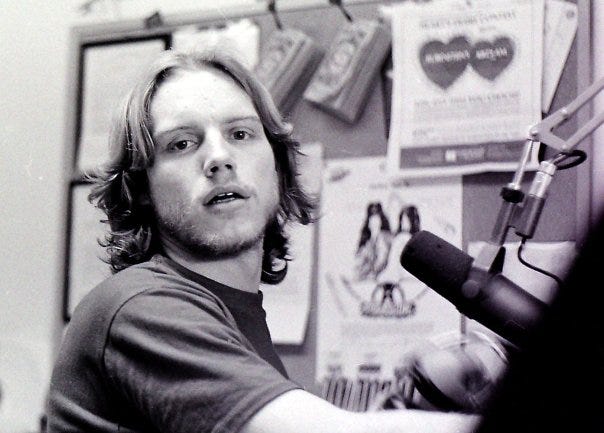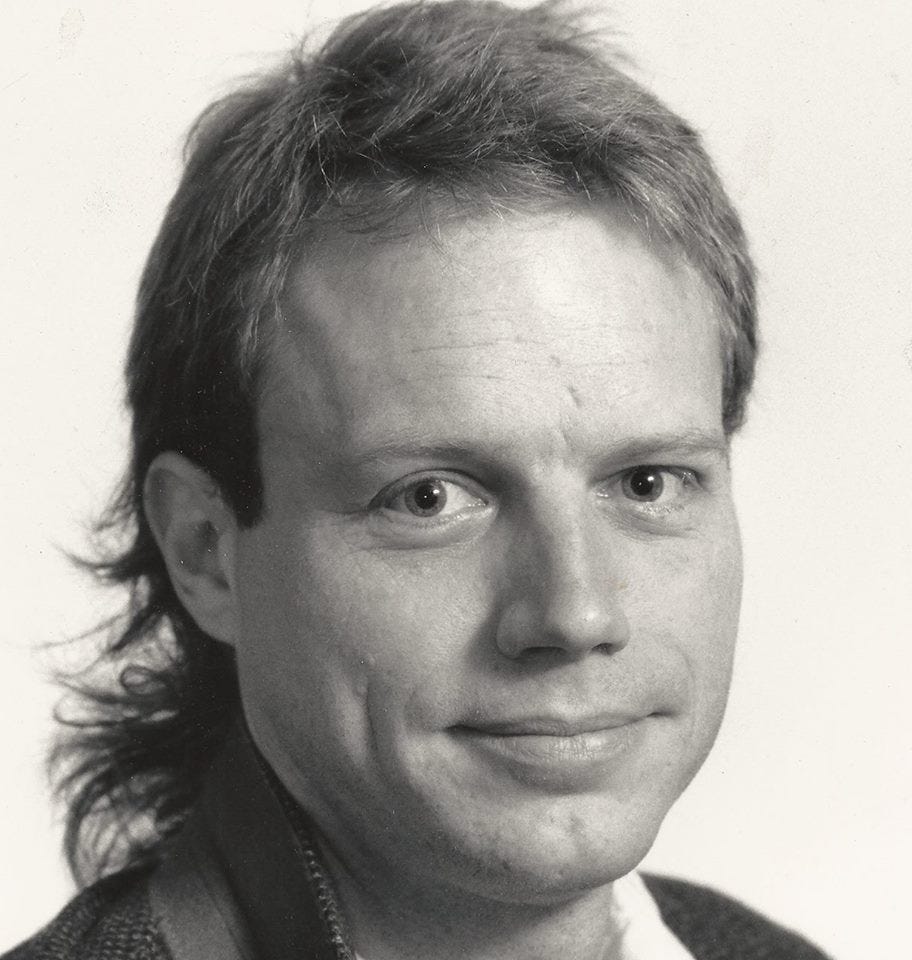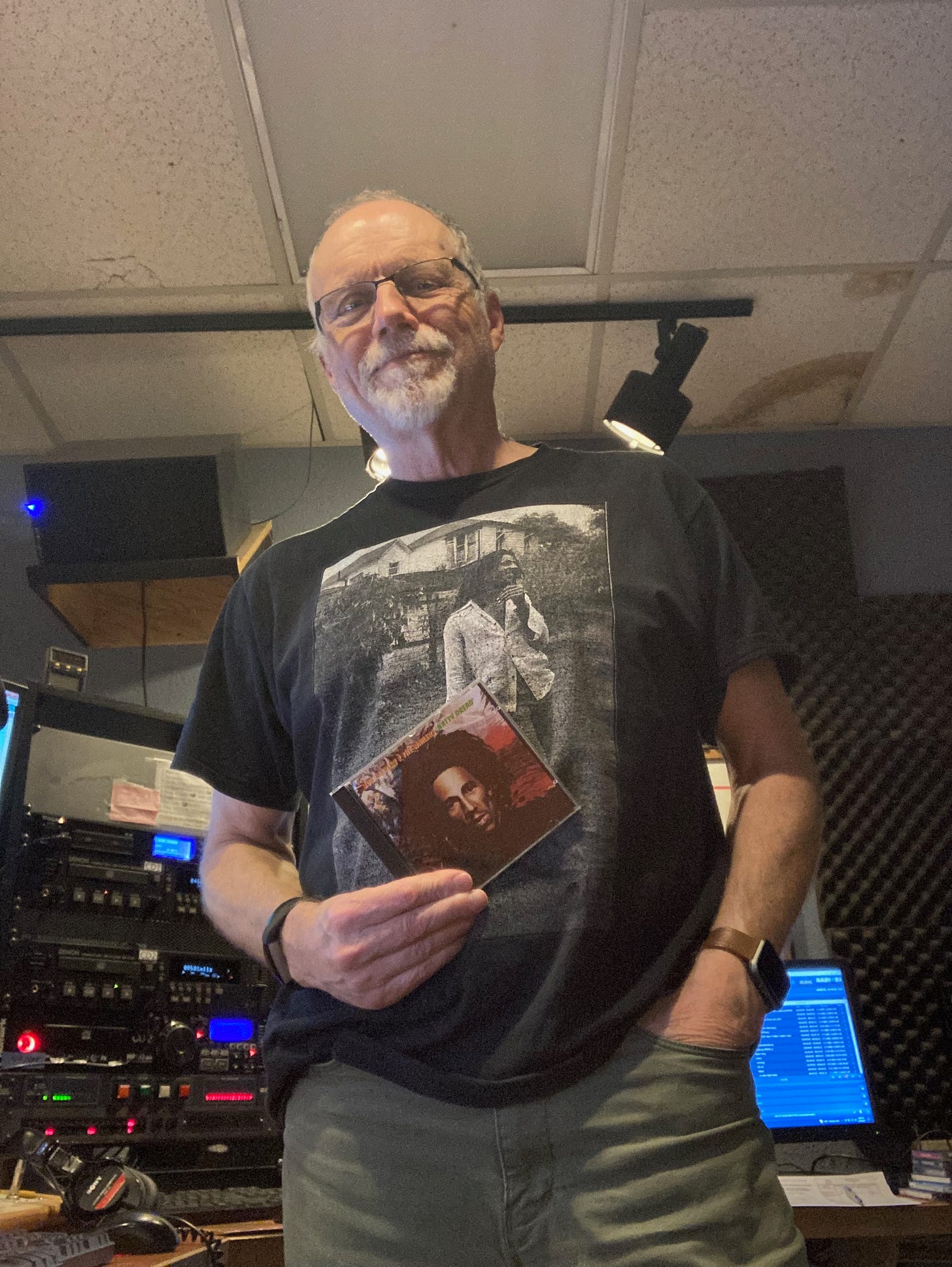It Was 50 Years Ago Today...
On April Fool’s Day, 1975, I became Tim Gordon. Fifty years later, I’m still on the air—and still loving it.
Fifty Years in Radio: A Reminiscence
Before I ever cracked a mic as a paid DJ, I had to make a split-second decision that would define the next five decades.
It was twenty minutes before I was to go on the air as a paid DJ for the first time.
The Program Director, Scott Forrest, approached me and asked, “What name are you going to use?”
Name? I hadn’t even thought about it. My name is Tim Patterson. But…I knew I wasn’t really crazy about using “Patterson” on the air. It was a little longer than I wanted, and I would probably keep popping the “P” at the beginning of the word.
I wanted something different. And with just twenty minutes, I had to scramble. I picked up the phone book from the desk in front of me and started at the beginning.
Tim Adams. No. Tim Anderson. No, too long. Tim this, Tim that.
Time was wasting. I had to come up with something.
I was at the Gs. Tim Gardner. Tim Gamble. Tim Gates. Tim Garrett.
Naah, none of those worked.
Tim Gordon.
Wait a minute. It wasn’t perfect, but it did have a ring to it, and it rolled off the tongue smoothly, but still had a little bite to it.
Tim Gordon.
I went into the broadcast studio and told Scott.
Tim Gordon, the 19-year-old radio announcer, was born on April Fool’s Day, 1975. I was starting my first job as a paid DJ at KACI, The Dalles, Oregon.
My radio career was off and running.
Fifty years have passed since that moment, and in some ways, it still feels present in my mind, like it happened yesterday—fifty years of being in (and out at times) of radio.
The Original Dream
If you’d asked me at the age of ten what I wanted to be when I grew up, I would have said, “A Beatle.” Being in the world’s most popular rock band seemed like the coolest job in the world. Of course, I was astute enough at that young of an age that I knew joining the Beatles was just a pipe dream, but I did love music and could see myself in a music career, especially one where I played drums or guitar and sang and played in front of scream hordes of rabid fans.
I was a drummer in many school bands: symphonic band, stage/jazz band, pep band, marching band, you name it, I played drums and other percussion instruments during my eight years of middle school, junior high and high school. It was my refuge, my love.
But something shifted when I was sixteen. A good buddy at the time, Ross Simmons, had just managed to get a job at one of the two local AM radio stations in Bend, Oregon, KGRL. The station played popular hit music at the time, which was generally referred to as Top 40, but because they were licensed as a daytime AM station, it signed off at sundown. This meant, to my delight, that during the winter, when they signed off as early as 4:15 or 4:30 pm, Ross and I could hang out in the studio – the actual studio where the real disc jockeys, including Ross (on weekends), did their fantastic and entrancing job of playing the hits. And once the station was no longer broadcasting, Ross would set me up in the studio to learn how it all worked.
I was hooked. It wasn’t the same as playing in a rock band, but it involved music, and it looked like the most fun a guy could have and get paid. I tried to convince the program director, Ben Tracy, to hire me, but he didn’t, so I decided to go to school and return. I chose Mt. Hood Community College in Gresham, Oregon, which had a two-year Radio Communications course that would immediately get me in front of a microphone and teach me all that I wanted to know about broadcasting, at least enough to help me get a job in the industry.
Broadcast School
Thirty-one students sat down with the instructor Ralph Rogers on day one. Ralph was unforgettable: he’d spent 35 years in radio. He had a deep voice (great pipes, as we called them), and would regularly entrance us with vivid stories of his days in radio, including time in Portland, and prior to that, with the old NBC Blue and Red Radio Networks, so he had some stories to tell.
That was in September 1973. Just over 18 months later, I saw the end of school coming. I needed a job. Starting in January 1975, I sent out sample tapes to radio stations in Oregon, hoping to get a response at least. These reel-to-reel tapes captured roughly three or four minutes of announcing, giving program directors a sample of my on-air prowess (or whatever you wanted to call it at that point!).
During Spring Break, I got a call from Scott at KACI, who invited me out to The Dalles for an interview. The Dalles is 90 miles east of Portland, up the Columbia River. We chatted for a while; he said he’d be in touch, and he offered me the job a day or two later.
The job offer was a bit strange: KACI was a day-timer, too, which meant the job would be full-time for at least six months. I would work 11 am—2 pm through April, then starting in May, I would do the 6 pm—sign-off shift. During June and July, that would be roughly until nine or 9:30. That shift would last through the summer and into fall, but after September and October, they couldn’t guarantee me a job, thanks to the licensing restrictions.
I jumped at the chance.
I went to school during the break and met with Ralph Rogers, who urged me to take the job. He’d gladly give me A’s in my remaining Radio classes (I was a good student) and gave me his blessing. I disappeared from campus during Spring Break and didn’t get a chance to say goodbye to any of my fellow radio students.
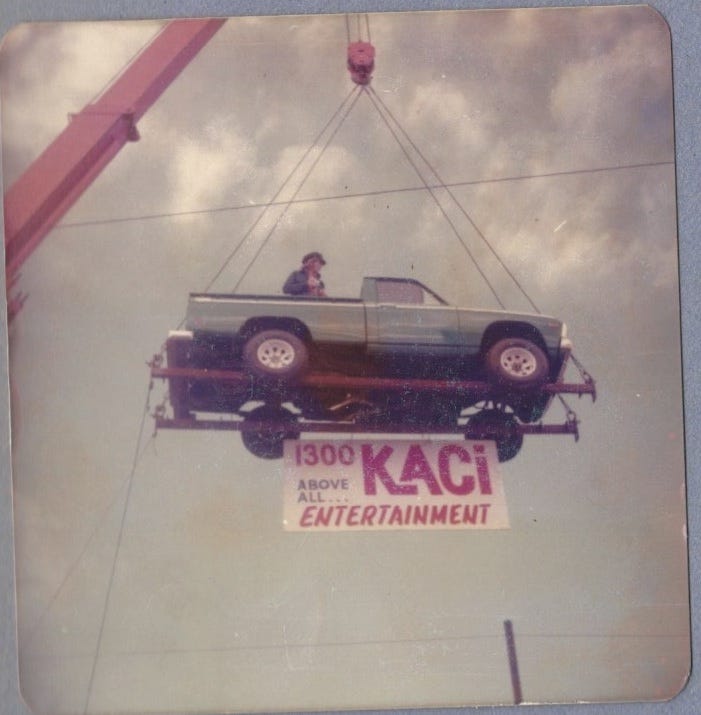
After a couple of weeks in The Dalles, as I became acclimated to the routine and the job, Scott asked if I was interested in being Music Director.
Music Director? Hell, yeah, that sounded like fun, and it was. It meant listening to all of the new music that came in, shifting hits, oldies, and new songs in and out of rotation, putting together a weekly list of our Top 40 songs. It meant fielding calls from record promoters pushing their latest releases.
It wasn’t playing in a band, but I’d found a home.
From The Dalles to Salem
I spent 18 months in The Dalles, then found a job in Salem at KBZY, where I was also offered the job of Music Director a couple of weeks after I’d arrived. KBZY was a ton of fun. I enjoyed the work, my fellow employees, and especially being a Music Director. I got to listen to a ton of new music, and record promoters were always inviting me to see touring bands. Can’t beat that, right?
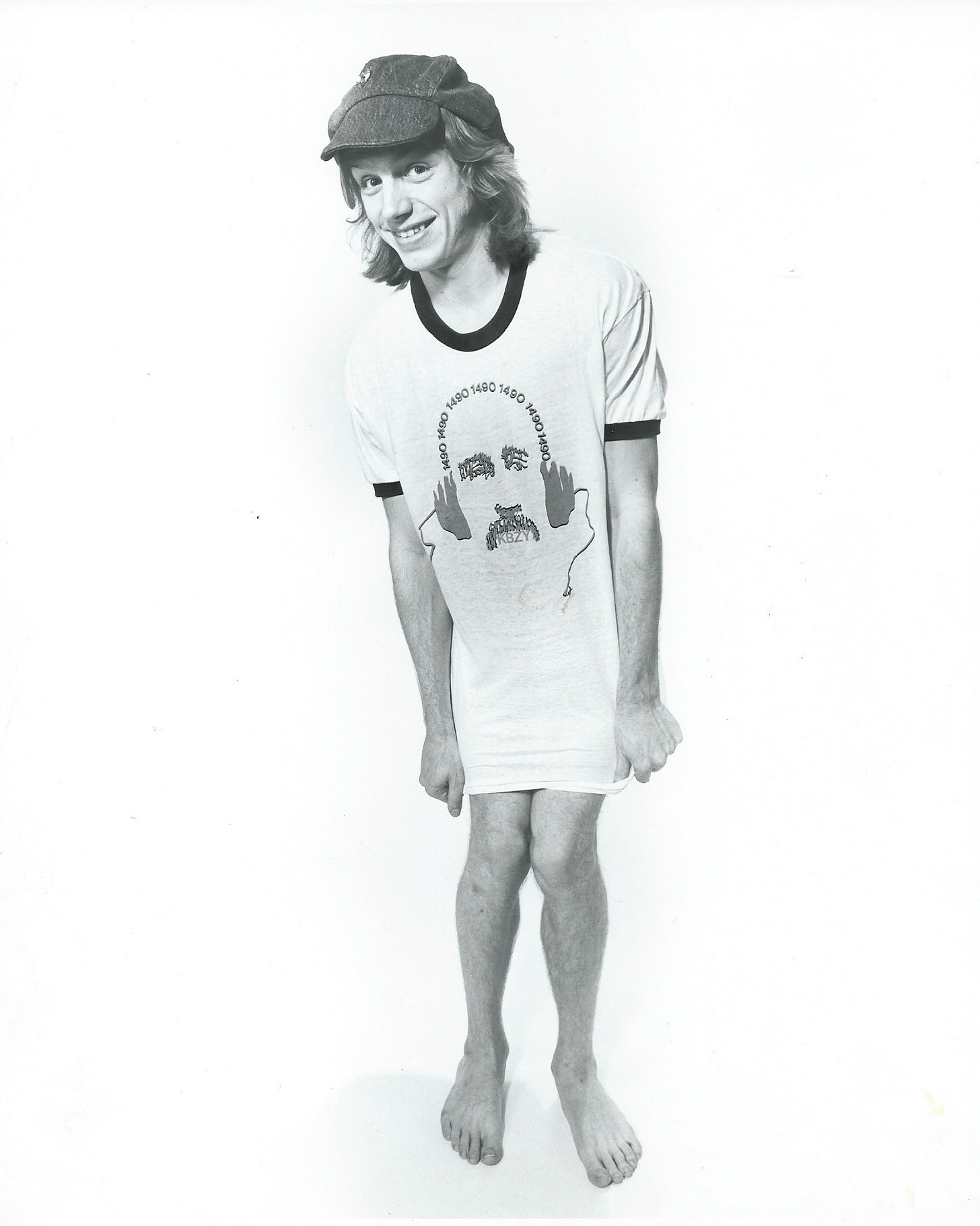
It was a run ride, but after seven years, three owners, and several program directors, I was fired for the first time in my radio career.
I’d been living with a roommate who had decided to move to Portland a short time earlier. My girlfriend and I followed, and I hoped to break into the Portland radio market.
Portland: The Big Hustle
Portland radio was a different animal, and I bounced around the Portland radio market for eleven years, working at a variety of stations: News Director at KCNR, a soft-rock hit station, KEX, a middle-of-the-road music station that in some ways was one of my favorite places to work thanks to the Program Director, Carl Gardner. Even though I worked only part-time (regular weekend shifts on Saturday and Sunday), I offered to fill in for anyone. That’s how I found myself filling in for full-timers when they went on holiday: mornings, mid-days, afternoons, news, traffic reporters (where we reported from the air in either a helicopter or a small Cessna fixed-wing), and one of the most interesting and challenging jobs: talk-show host.
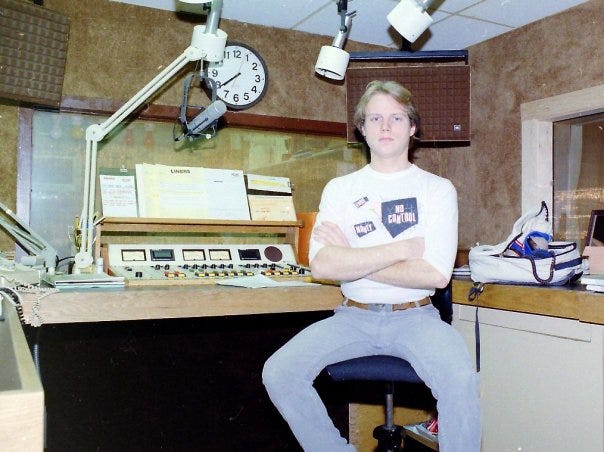
One of the evening talk shows of the time, Northwest at Night, was hosted by former morning show host “Uncle” Don Wright, and when Carl gave me the green light to fill in for Don, I wondered what I’d gotten myself into. Don’s show was from 8 until midnight, five nights a week. I quickly learned that hosting a talk show ain’t for wimps. It’s challenging work, and there’s a ton of prep that goes into every hour.
I vividly remember my first night. I’d lined up a series of guests with questions and topic starters. I was as prepared as I could possibly be. But the world has a funny way pulling the rug out from under you. That day, April 15th, 1986, President Reagen gave the go-ahead for the US Military to bomb Libya and try to carry out an assassination attempt on Muammar Gaddafi.
All bets were off.
With the approval of my producer, Rich Patterson (no relation), I threw out the playbook for the night, and did nothing but talk about the bombing. I played devil’s advocate. I tried not to take sides. I tried to make sense of it like the rest of it. The calls lined up, and we talked about the bombing all night long.
Eventually, while I realized I could do a talk show, I decided I didn’t want to pursue that line of work.
Oldies and On-Air Freedom
In January 1988 I was hired to be part of a new crew that was taking over an FM signal at 97.1, and putting Oldies on the air, to bring back the old KISN station from the days when KISN-AM owned the Portland airwaves. For the next three years, I did the 7-midnight shift, as KISN-FM stayed in the Top 5 rankings for much of those years. It was some of the most fun I’d ever had on the radio, and while I wasn’t Music Director, I was given a fair amount of leeway with the oldies I played on the air. Each night I had a Top 8 at 8 segment, where I counted down eight songs with a theme or topic. Occasionally, I’d bring in a local musician or celebrity and have them pick their favorite eight oldies. Fun stuff.
Then a new Program Director was hired. I was told I was no longer needed and found myself on the street again.
The Seven-Week Morning Show
Over the next few years, I worked part and full-time at KUPL-AM and FM (Country), KMXI (Oldies). The KMXCI gig came to me when I was down and out. I’d been working a few shifts a week at KUPL, and given that there was a great full-time crew, there was no opportunity to move into a full-time position. I picked up a part-time job at Music Millennium, Portland’s great long-time record and CD store. I found I really liked the job, liked working retail and chatting with customers of all stripes. Unfortunately, it didn’t pay much, so I had my eyes open. Bill Jackson, KMXI’s Program Director, whom I’d worked with at KCNR several years prior, called me out of the blue one day and asked if I’d be interested in the mid-day shift. I told him of course, so I spent the next couple of years there. But then the station owners were going to change format, which oddly enough led to one of the more interesting seven weeks of my radio life. Once the decision to change formats was made (we all heard it was going to be classical music, and we all couldn’t believe it because we all – meaning the announcers – knew it would not be successful), the management dropped everyone that was on a full-time salary but offered many of us the chance to stay on for a couple of months while they prepared the format change.
I had an idea: my buddy Rich Wahne and I had always wanted to do a full-on radio morning show, so we approached the owner, Bill Failing and floated the idea. He thought about it a couple of days, then gave us the green light.
“Just don’t lose the license,” he said. “And I can only pay you ten dollars an hour.”
We started right away, putting together a two-man morning show, the lowest-paid in town, and tried to see what we could do. It was nutty, it was fun, we had a gas for seven weeks. We recorded our show every day, hoping to get tape so that we could pitch our show to other stations in Portland, or anywhere, for that matter, that was looking for our brand of zany. Or whatever you wanted to call it.
As the next seven weeks unfolded, we started by playing the oldies that were dictated by the daily printed playlist. But it didn’t take long for us to start inserting our own music mix. We started to implement music theme days: Wimpy Mondays, where we played stuff like Barry Manilow, the Carpenters and so on. We had Rowdy Reggae Wednesdays where we played nothing but great reggae. We had All Beatles Friday. And so on. Like I said, it was a gas.
We had access to a hired voice talent across the country that would do liners for us for free, so we sent him the goofiest stuff we could think of to make the show more fun. We had characters on the show, such as JJ the Intern, Stu the Security Guard, Bob and Phil, former professional wrestlers who ran a beauty salon, we had Chin and Win, who ran a Chinese restaurant where you couldn’t actually purchase any food, called the House of No. I have no idea where it all came from.
Frankly, much of it was half-baked, and even though many bits were great, much of it came off as needing more polishing. But we had no producer, and little time to actually make it work.
Still, it remains one of the more memorable moments in a radio career that’s had its share of memorable moments.
Back to Salem: News, Commercials, and a New Chapter
In 1994, I was again out of a job, and got a call from Mike Frith, who owned a news-talk radio station in Salem, saying he had a fulltime job for a production director. We talked, and I accepted the job. During the next 6 and a half years, I wrote and voiced commercials, became part of a three-man morning team delivering the news each weekday.
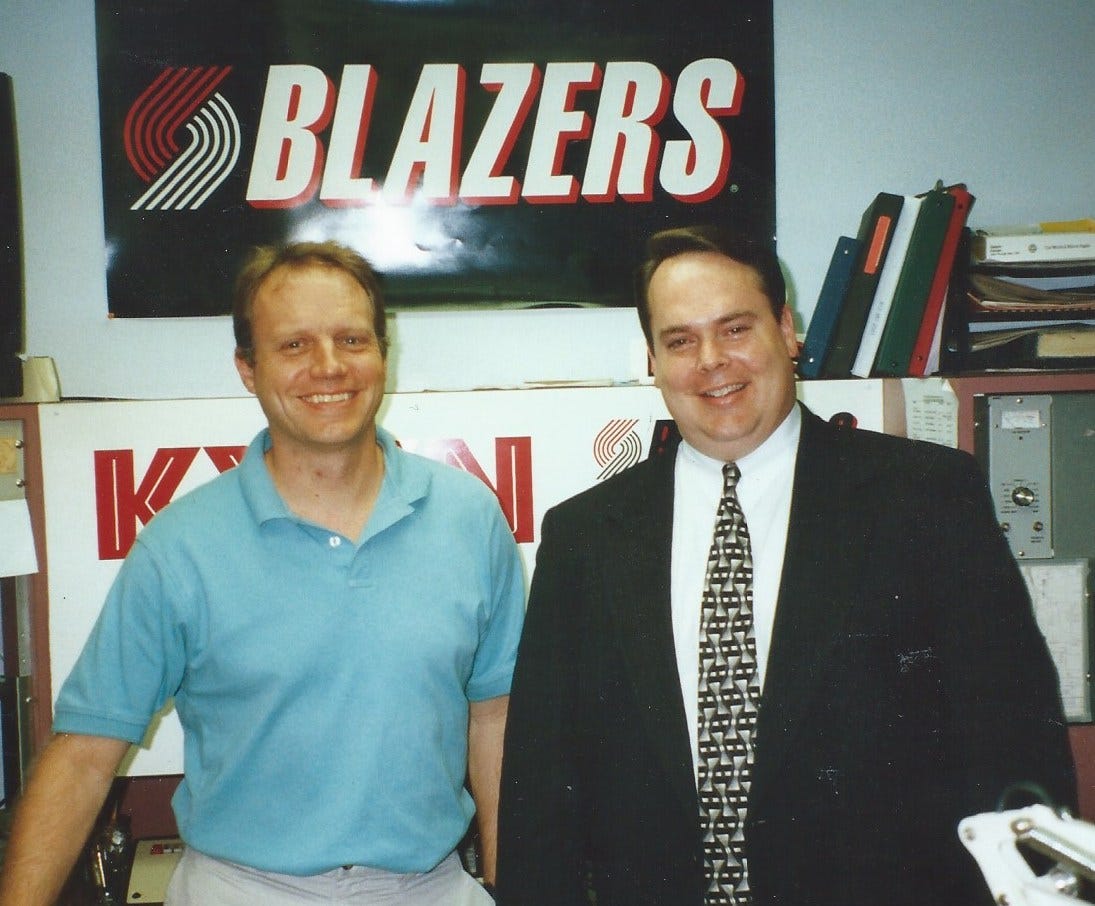
At one point, Mike purchased a radio station in town, KSLM, that was going out of business. We put Oldies on the air, he made me program director and morning show host. We had another live DJ in the afternoon, but other than that, it was automated. The sad thing was, that while it was a fun station, it was hard to compete with a music AM station, and Mike ended up selling the signal a couple of years later. In August 2000, the day I returned from a week-long vacation, Mike called me into his office, said he couldn’t afford to pay me anymore, and let me go.
KPAM, 9/11, and the End of the Line
I had a wife and baby and needed work, so I accepted a full-time job in Portland at KPAM radio, a news-talk station that had been funded by a well-to-do family that had other media interests. The new on-air crew had been created when KPAM raided popular stations in town, offering big sums of money to well-known talent and promising them that they’d be employed for at least three years. I’d been promised the same. It was early 2001. I was hired to hold down the news from 7 pm to 4 am, Monday – Friday. Crazy hours, especially when you consider I had the hour drive from Salem each day. The most memorable day of that short stint was 9/11, when I woke up at around one o’clock, turned on the TV and saw the twin towers coming down in replay, over and over again. That night on the air was a bit surreal.
At Thanksgiving, the station reneged on their promises, and let three or four of us go, and for the next little while I worked at KGON (Classic Rock), KXL (News/Talk).
Out of Radio
For the first time, I accepted a full-time job out of radio: working at Hollywood Video in Salem as a “Manager Trainee.” The pay was crappy, but at least I got to see movies for free.
I’d been there just about three weeks, when a friend of a friend came in to rent a video, and she asked why I was working there. I told her I needed the job, and the next day, her husband, Ed, called me and said he had a job opening at his company, Interpretive Exhibits. I agreed to an interview.
We chatted for an hour as I learned about an industry that I had no idea even existed: exhibits. Interpretive Exhibits was a small Salem company that did mostly high-end work for government agencies, non-profits, and some commercial work. They wanted a sales person to pursue business in the commercial world. After an hour of chatting, Ed offered me the job for more money than I’d ever made before. It was nearly three times what I was making at Hollywood Video.
“But I know nothing about exhibits.”
“But you have good people skills. I can teach you about the business.”
I told him I’d think about it for 24 hours, but I already knew I would take the job. When I accepted his offer the next day, my radio career as a full-time employee behind the microphone ended. A new life was beginning.
KMUZ: Full Circle
But I wasn’t done with radio. A few years later, I heard a rumor about a new radio station about to start in Salem. There wasn’t much to the rumor, but oddly enough, it was true. A small group was eventually granted a low-power, non-commercial license. I got wind of a “Radio Rally” for the station, which I attended. I heard the pitch and signed up as a volunteer, thinking eventually I would be able to get my long-desired reggae show. Instead, it was the beginning of an intense couple of years as the licensees raced to meet the terms of the license: start broadcasting within three years of the license being granted.
Unfortunately, the group was dead in the water: no funds, nowhere to turn for equipment or where to build a studio.
I got more involved, because I had some radio experience and knew people. I called an engineer friend, Mike Everhart, who was head of Alpha Broadcasting in Portland, a group of five or six stations that was consolidating all of their station into a single downtown location. Lo and behold, my timing was perfect: in the process of moving the stations, they had a lot of equipment that would sold, donated, or junked. I ended up bringing about four SUV loads of equipment from Portland to Salem, including some radio consoles, and critically, a transmitter. All of that, along with some other timely experienced volunteers, helped get KMUZ-FM on the air by the skin of our teeth.
Over thirteen years later, I’m still involved. I got to do my reggae show, which I have done for over thirteen years every Monday night, and have served on the station’s board of directors off and on, and am currently its president.
I don’t get paid; it’s a strictly volunteer organization, and it’s challenging (this week, for example, we’re moving our studios for the first time in over thirteen years – not an easy thing), but it’s kept me in radio, for which I’m grateful.
Fifty Years
It’s been fifty years since I became Tim Gordon.
A name I found in a phone book.
It was a journey that took me from teenage dreams to all-night talk shows, to music countdowns, to reggae on a Monday night in Salem.
Still on the air. Still loving it.
What a trip.





